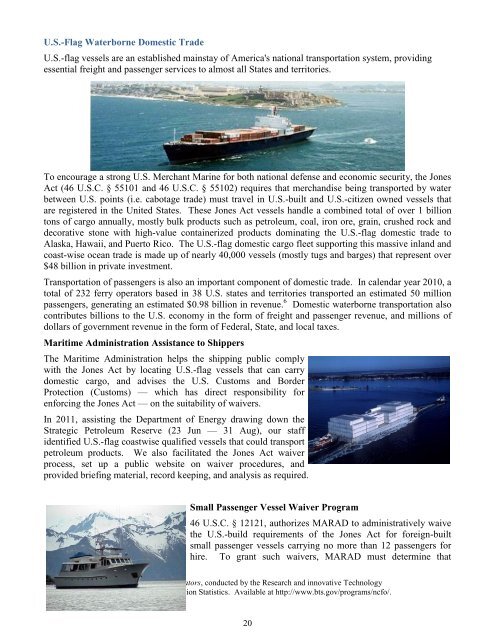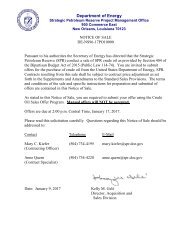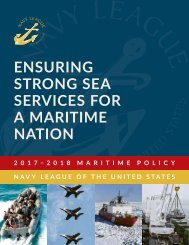2010-11_ANNUAL_REPORTS_-_FINAL_VERSION_(3)
2010-11_ANNUAL_REPORTS_-_FINAL_VERSION_(3)
2010-11_ANNUAL_REPORTS_-_FINAL_VERSION_(3)
Create successful ePaper yourself
Turn your PDF publications into a flip-book with our unique Google optimized e-Paper software.
U.S.-Flag Waterborne Domestic Trade<br />
U.S.-flag vessels are an established mainstay of America's national transportation system, providing<br />
essential freight and passenger services to almost all States and territories.<br />
To encourage a strong U.S. Merchant Marine for both national defense and economic security, the Jones<br />
Act (46 U.S.C. § 55101 and 46 U.S.C. § 55102) requires that merchandise being transported by water<br />
between U.S. points (i.e. cabotage trade) must travel in U.S.-built and U.S.-citizen owned vessels that<br />
are registered in the United States. These Jones Act vessels handle a combined total of over 1 billion<br />
tons of cargo annually, mostly bulk products such as petroleum, coal, iron ore, grain, crushed rock and<br />
decorative stone with high-value containerized products dominating the U.S.-flag domestic trade to<br />
Alaska, Hawaii, and Puerto Rico. The U.S.-flag domestic cargo fleet supporting this massive inland and<br />
coast-wise ocean trade is made up of nearly 40,000 vessels (mostly tugs and barges) that represent over<br />
$48 billion in private investment.<br />
Transportation of passengers is also an important component of domestic trade. In calendar year <strong>2010</strong>, a<br />
total of 232 ferry operators based in 38 U.S. states and territories transported an estimated 50 million<br />
passengers, generating an estimated $0.98 billion in revenue. 6 Domestic waterborne transportation also<br />
contributes billions to the U.S. economy in the form of freight and passenger revenue, and millions of<br />
dollars of government revenue in the form of Federal, State, and local taxes.<br />
Maritime Administration Assistance to Shippers<br />
The Maritime Administration helps the shipping public comply<br />
with the Jones Act by locating U.S.-flag vessels that can carry<br />
domestic cargo, and advises the U.S. Customs and Border<br />
Protection (Customs) — which has direct responsibility for<br />
enforcing the Jones Act — on the suitability of waivers.<br />
In 20<strong>11</strong>, assisting the Department of Energy drawing down the<br />
Strategic Petroleum Reserve (23 Jun — 31 Aug), our staff<br />
identified U.S.-flag coastwise qualified vessels that could transport<br />
petroleum products. We also facilitated the Jones Act waiver<br />
process, set up a public website on waiver procedures, and<br />
provided briefing material, record keeping, and analysis as required.<br />
Small Passenger Vessel Waiver Program<br />
46 U.S.C. § 12121, authorizes MARAD to administratively waive<br />
the U.S.-build requirements of the Jones Act for foreign-built<br />
small passenger vessels carrying no more than 12 passengers for<br />
hire. To grant such waivers, MARAD must determine that<br />
6 <strong>2010</strong> National Census of Ferry Operators, conducted by the Research and innovative Technology<br />
Administration’s Bureau of Transportation Statistics. Available at http://www.bts.gov/programs/ncfo/.<br />
20




